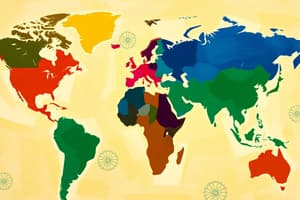Podcast
Questions and Answers
What does the article primarily aim to summarize regarding sovereignty?
What does the article primarily aim to summarize regarding sovereignty?
- Recent philosophical discourses on sovereignty
- The historical development of state sovereignty
- Recent research on sovereignty, the state, and state-building (correct)
- Different models of state governance
Which theoretical approach does Giddens propose regarding sovereignty?
Which theoretical approach does Giddens propose regarding sovereignty?
- A decentralized approach that rejects international influence
- An interdependence model based solely on societal factors
- A proto-theory that emphasizes the international dimension of sovereignty (correct)
- A realist perspective focusing solely on state relations
According to the discussion, what contributes to the erosion of traditional views of sovereignty?
According to the discussion, what contributes to the erosion of traditional views of sovereignty?
- Growing economic interdependence among regions
- Increased political stability among nation-states
- The emphasis on state governance over societal interests
- The devolution of sovereignty to 'the people' (correct)
What significant aspect of sovereignty is often ignored in traditional political philosophy?
What significant aspect of sovereignty is often ignored in traditional political philosophy?
How is the recognition of sovereignty's international dimension characterized?
How is the recognition of sovereignty's international dimension characterized?
Which philosopher argued for the elimination of sovereignty as a conventional concept?
Which philosopher argued for the elimination of sovereignty as a conventional concept?
What is a major criticism of both realist and liberal treatments of sovereignty?
What is a major criticism of both realist and liberal treatments of sovereignty?
What are indicators of sovereignty intended for in the article?
What are indicators of sovereignty intended for in the article?
What assumption do state-centric theories in International Relations primarily rely on?
What assumption do state-centric theories in International Relations primarily rely on?
Which factor did liberal interdependence theorists argue contributes to the erosion of state sovereignty?
Which factor did liberal interdependence theorists argue contributes to the erosion of state sovereignty?
What impact does modern technology have on state efforts to control borders, according to the content?
What impact does modern technology have on state efforts to control borders, according to the content?
Critics of liberal interdependence argue primarily that:
Critics of liberal interdependence argue primarily that:
What type of actors has technology empowered in terms of evading state control?
What type of actors has technology empowered in terms of evading state control?
What is a consequence mentioned regarding the flow of capital in relation to state sovereignty?
What is a consequence mentioned regarding the flow of capital in relation to state sovereignty?
Which of the following is NOT cited as a challenge to state control?
Which of the following is NOT cited as a challenge to state control?
How do liberal interdependence theorists view the relationship between state sovereignty and economic interdependence?
How do liberal interdependence theorists view the relationship between state sovereignty and economic interdependence?
What is the main factor in achieving recognition as a sovereign state according to the content?
What is the main factor in achieving recognition as a sovereign state according to the content?
Which period exemplifies the complexity of defining state sovereignty in relation to power capabilities?
Which period exemplifies the complexity of defining state sovereignty in relation to power capabilities?
Which of the following examples highlights a state exerting sovereignty without external recognition?
Which of the following examples highlights a state exerting sovereignty without external recognition?
What role do Great Powers play in the recognition of state sovereignty?
What role do Great Powers play in the recognition of state sovereignty?
What did Waltz suggest about the essence of state sovereignty?
What did Waltz suggest about the essence of state sovereignty?
Which concept did the content suggest might be more important than recognition for contemporary states?
Which concept did the content suggest might be more important than recognition for contemporary states?
What conclusion can be drawn about the relationship between recognition and actual state power?
What conclusion can be drawn about the relationship between recognition and actual state power?
What is implied about the majority of today's sovereign states?
What is implied about the majority of today's sovereign states?
Which of the following is mentioned as a key factor for the recognition of new states in Eastern Europe and the former Soviet Union?
Which of the following is mentioned as a key factor for the recognition of new states in Eastern Europe and the former Soviet Union?
What does Nadelmann's work suggest about the internationalization of U.S. law enforcement?
What does Nadelmann's work suggest about the internationalization of U.S. law enforcement?
According to the 1993 Amnesty International report, in what year did human rights abuses reach their highest level?
According to the 1993 Amnesty International report, in what year did human rights abuses reach their highest level?
What could constitute norms of contemporary sovereignty?
What could constitute norms of contemporary sovereignty?
What is a possible indicator of a shift from sovereignty to neo-heteronomy?
What is a possible indicator of a shift from sovereignty to neo-heteronomy?
Which of the following would indicate a loss of state monopoly on coercion?
Which of the following would indicate a loss of state monopoly on coercion?
In the context of state authority, what does deterritorialization imply?
In the context of state authority, what does deterritorialization imply?
How are East Europeans viewed in terms of standards for sovereign recognition as compared to extra-European states?
How are East Europeans viewed in terms of standards for sovereign recognition as compared to extra-European states?
What is the current status of states' recognition power?
What is the current status of states' recognition power?
What does the increasing activism of the UN suggest about state sovereignty?
What does the increasing activism of the UN suggest about state sovereignty?
How do individuals primarily identify in relation to the state and other entities?
How do individuals primarily identify in relation to the state and other entities?
What is indicated by the statement about the change in democratic control over policy making in collective institutions?
What is indicated by the statement about the change in democratic control over policy making in collective institutions?
How do Great Powers typically respond to the nonintervention norm?
How do Great Powers typically respond to the nonintervention norm?
What does the growth in private coercive activities indicate about state monopolization of coercion?
What does the growth in private coercive activities indicate about state monopolization of coercion?
What can be inferred about the territorial borders following the breakup of the Soviet empire and Yugoslavia?
What can be inferred about the territorial borders following the breakup of the Soviet empire and Yugoslavia?
What is the implication of states acting unilaterally in coercive interventions?
What is the implication of states acting unilaterally in coercive interventions?
Flashcards are hidden until you start studying
Study Notes
State Sovereignty in International Relations
- State sovereignty is a defining characteristic of the international relations (IR) discipline.
- The article examines state sovereignty from a theoretical framework, analyzing how it is impacted by interdependence and state-building processes.
- The author criticizes both realist and liberal interdependence approaches to sovereignty for failing to account for the "international" dimension of sovereignty.
- Sovereignty is constituted not just through state-society relations but also through interstate relations.
- The article highlights the importance of recognition by other states in establishing a state's sovereignty.
- The recognition of a state's sovereignty is not solely based on power capabilities.
- Other factors such as adhering to international norms (e.g., respecting human rights, controlling nuclear weapons) can influence recognition.
- The author argues that despite the challenges posed by interdependence and globalization, state sovereignty remains a strong concept.
- The article concludes that state sovereignty is not in danger of being eroded due to the continued dominance of state-centric institutions and the lack of convincing evidence of any significant shift in power dynamics.
Measuring Sovereignty
- Sovereignty can be measured by analyzing state authority across four key elements:
- Power to recognize sovereignty
- Diffusion of meta-political authority into alternative entities (e.g., religious organizations, transnational corporations, international institutions)
- State monopoly on coercion
- Territorialization of state authority
Implications of Erosion of Sovereignty
- If sovereignty is being eroded, it would be characterized by:
- A change in the authority responsible for recognizing statehood
- The shifting of power away from states
- The state losing its monopoly on coercion
- Territorial authority being replaced by broader jurisdictional claims
Contemporary International Relations
- Despite the rise of globalization and the growing influence of international organizations, states still retain a dominant position in the international system.
- Collective intervention by states in the name of human rights is still a critical aspect of international diplomacy, demonstrating the continued importance of state sovereignty in legitimizing international actions.
- The international system is characterized by a complex interplay of state actions, intergovernmental organizations, and non-state actors.
- While state sovereignty remains an important concept in international relations, there are ongoing discussions about its relevance and future in a globalized world.
Studying That Suits You
Use AI to generate personalized quizzes and flashcards to suit your learning preferences.




